#lotr book
Text
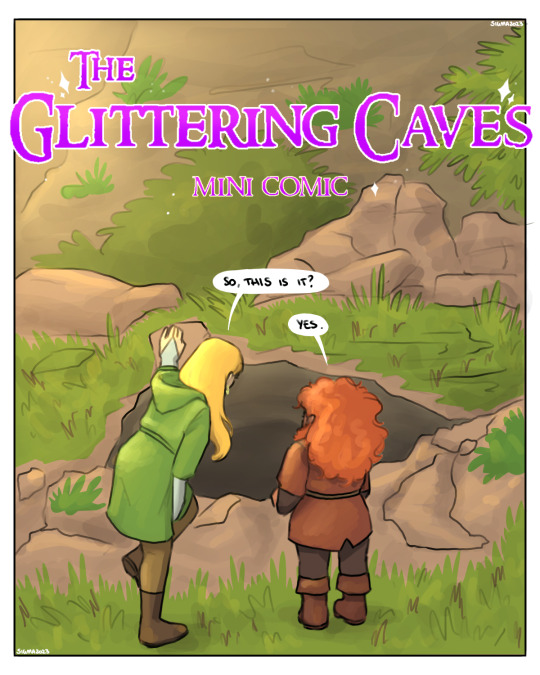
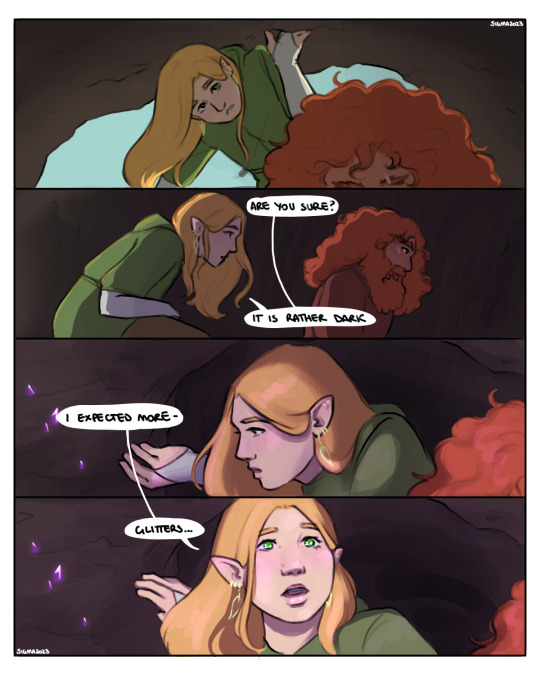
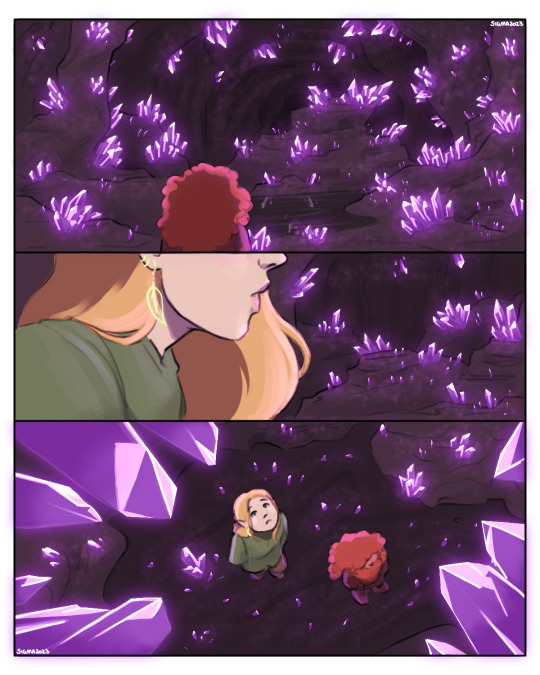
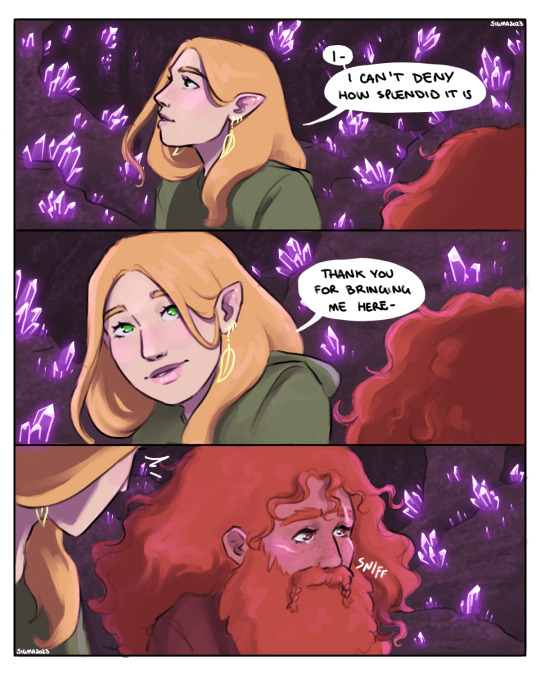
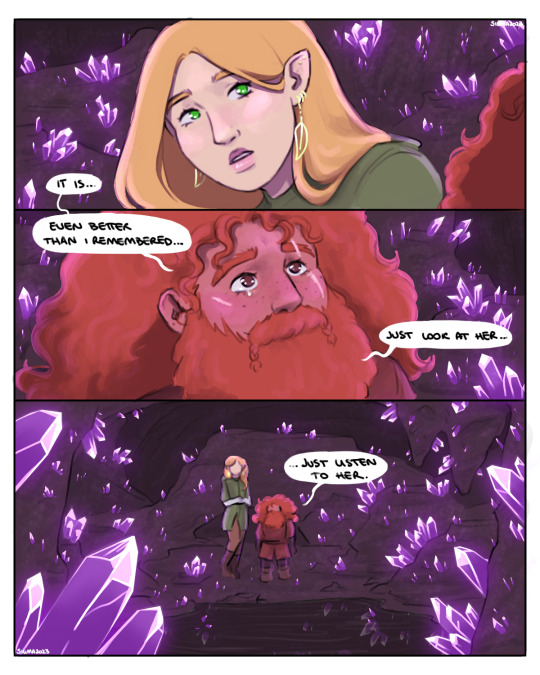
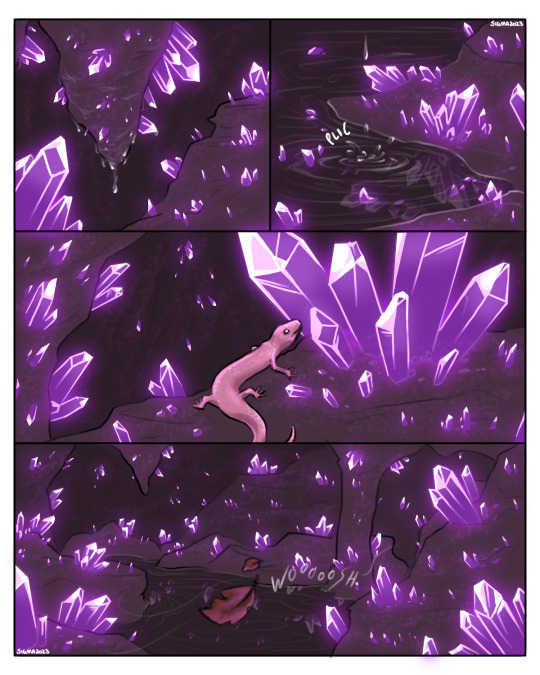
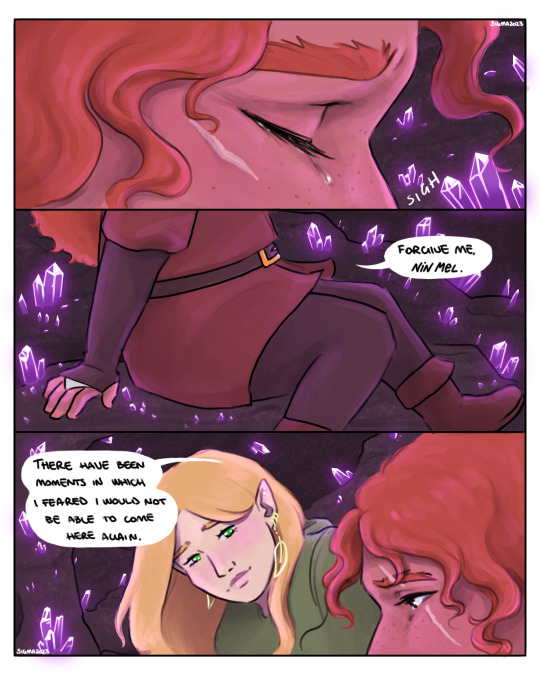
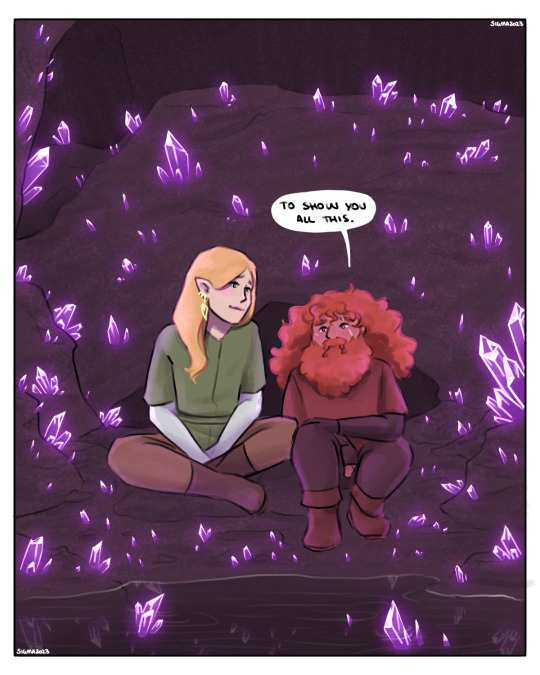


Gay people do love glitters
art • commissions
#lotr#gimli son of gloin#legolas#legolas x gimli#lord of the rings#lord of the rings fanart#lotr fanart#my art lotr#my comics#gimleaf#legolas greenleaf#glittering caves#lotr books#lotr books fanart#lotr book#lotr fancomic#fancomic#I think my love for nature is very obvious in this one#and it bit me in the ass because omg all those crystals#but it was worth it#god I love these two#gigolas#“nin mel” is wrong bc i didnt find a right source to translate sindarin so sorry for that#my art
2K notes
·
View notes
Text
I FORGOT SAM ACTUALY TOUGHT ABOUT KILLING HIMSELF WHEN HE TOUGHT FRODO WAS DEAD
#pls ignore my spelling#IM READING IT RN AND THIS ALMOST MADE ME CRY#samwise gamgee#sam and frodo#frodo#sam#frodo baggins#lotr#lord of the rings the two towers#lord of the rings#the two towers#the two towers spoiler#tolkien#middle earth#the lord of the rings#jrr tolkien#shelobs lair#shelob#lotr book#lord of the rings book#two towers#the two towers book#sam gamgee#tw sui implied#tw suicide#tw sui
16 notes
·
View notes
Text
I think one of the most interesting things I've read so far in the lord of the rings books, is how Frodo didn't expect the big folk to not be stupid. I could be wrong, but I'm pretty sure he said something along the lines of, ''I only ever expected the big folk to be kind and stupid, or cruel and stupid.''
And I suspect the rest of the story will be proving him wrong, will keep you updated. (please correct me if I'm wrong by showing me the source material.)
#frodo#frodo baggins#lotr#lord of the rings#tolkien#lord of the rings book#lotr book#frodo lord of the rings#lord of the rings frodo#lotr frodo#frodo lotr
8 notes
·
View notes
Text

Taking a 5-second break from the Bagginshield angst to bring you this meme I created after an all-nighter, enjoy.
#lotr#lord of the rings#aragorn#books#movies#tolkien#what about second breakfast#like yeah girl what ABOUT it#I’m both parties in this scenario tbh#sorry if this has been done before#I’m just a girl#a girl running on 3 hours of sleep
6K notes
·
View notes
Text
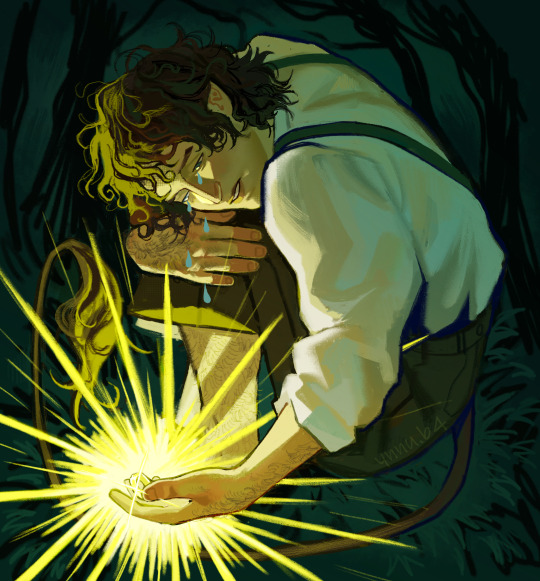
brave hobbit
#my art#art#frodo baggins#lotr#lotr fanart#lord of the rings#the lord of the rings#lotr frodo#the hobbit#i love frodo so much#after like 11 years of loving lotr i will finally read the books#finally getting them#hobbits shall have tails !!!
8K notes
·
View notes
Text

#obscure books#silmarillion#the silm#the silmarillion#the silm fandom#lord of the rings#lotr#tolkien#jrr tolkien#lotr rop#lotr trop#lotr memes#tolkien memes
4K notes
·
View notes
Text
One difference between the Lord of the Rings books and the Peter Jackson films that I find really interesting is what the hobbits find when they return to the Shire.
In the books, they return from the War, only to see that the war has not left their home untouched. Not only has it not left their home unscathed, battle and conflict is still actively ravaging the Shire. They return, weary and battle-scarred, to find a home actively wounded and in need of rescue and healing. All four launch themselves into defending their home and rousting those harming it, and eventually succeed. But their idyllic home has been damaged, and even once healed, is never quite again the Shire they set out to save.
In contrast, in the Jackson films, they return to a Shire shockingly untouched by the horrors of war. The hobbits of the Shire talk, in the Green Dragon in Fellowship of the Ring, about not getting involved with issues "beyond our borders," and it seems those issues have not invaded their sanctuary. After having been bowed to by kings, dwarves, elves, and men alike at the coronation in Gondor, their only acknowledgment upon returning home is a skeptical head shake from an older hobbit.
One of the most poignant scenes to me in Return of the King (and there are a considerable amount) is the scene where Frodo, Sam, Merry, and Pippin are sitting in the Green Dragon. The pub patrons bustle around them, talking loudly, clapping excitedly, drinking cheerfully, just as they had in the beginning of the story. But the four hobbits sit silently, watching almost curiously at what was once familiar but is now foreign to them. Their home has not changed. But they have.
Which is the deeper hurt? To come to your home to find it irrevocably changed, despite all you did to keep it untouched and the same? Or to return home but no longer feeling at home, because it is only you that is irrevocably changed?
20K notes
·
View notes
Text

I've finally finished this one! An untidy, yet cosy fantasy/sci-fi bookshop, with a stack of old paperbacks on the counter.
Prints available here
25K notes
·
View notes
Text
8K notes
·
View notes
Text
Every time I read or watch Lord of the Rings I can’t help but think about how Tolkien had survived one of the bloodiest, most cruel, most dirtiest and darkest wars in human history, came back and wrote this:
“The world is indeed full of peril, and in it there are many dark places; but still there is much that is fair, and though in all lands love is now mingled with grief, it grows perhaps the greater.”
And this:
"'I wish it need not have happened in my time,' said Frodo.
'So do I,' said Gandalf, 'and so do all who live to see such times. But that is not for them to decide. All we have to decide is what to do with the time that is given us.'"
And this:
"I do not love the bright sword for its sharpness, nor the arrow for its swiftness, nor the warrior for his glory. I love only that which they defend."
And this:
“Many that live deserve death and some that die deserve life. Can you give it to them? Then do not be so eager to deal out death in judgement. For even the wise cannot see all ends."
And this:
“True courage is about knowing not when to take a life, but when to spare one.”
And clearly they were all written partly because he survived the war, because of what he’d seen and done and learned. But at the same time the unwillingness to lose faith, the courage and strength that this man had to believe in these things after going through hell! It makes the nihilists look so cheap, so uninteresting! People who’ve went through concentration camps and wars believe in humanity anyway, isn’t that proof that hope and love exist? And many, many, many of them did not return or returned broken and cruel and traumatised to the point when no faith in others was possible for them, and nobody can blame them. But there were many who refused to lose faith and hope. They have seen some of the worst that life has to offer and came back believing that we shouldn’t be eager to deal out death in judgement and should love only that which the sword defends.
No matter how many people say that humanity is horrible and undeserving of love, and life is dark and worthless, and love doesn’t exist I remember this and have hope anyway. Because there were people who have actually had all reason to believe in the worst and still believed in the good, so the good must be real. The good is real, even despite the evil, and we must trust in it.
#tolkien#jrr tolkien#lord of the rings#lotr#the hobbit#jirt#silmarillion#beren and luthien#john ronald reuel tolkien#frodo baggins#gandalf#gandalf the grey#gandalf the white#galadriel#quotes#book quotes#lotr quotes#world war one#ww1
3K notes
·
View notes
Text
I love how entirely guilty Boromir feels after trying to get the ring from Frodo. The way he calls out to him after realizing what he’s done, the way he falls to the ground and cries. He was more than this moment, and he bravely defended his little friends, making them seem important to the cause and keeping them alive. I love him. He’s imperfect, but noble. He was more than that moment. He was all the moments before, and the moments after.
#lotr#rereading the series and feeling overly emotional about book characters#lord of the rings#the fellowship of the ring#Boromir#frodo baggins
2K notes
·
View notes
Text
Ok, time for a hot take.
It really bothers me that Rosie and Sam’s relationship is reduced and made so shallow in the films, with the implication that they’ve never even talked to each other, and Sam is pining for this girl he doesn’t really know….
Like …
… this actually misses the entire point of their relationship in the book.
In the book, Sam and Rosie grew up together. His warmest memories that bring him comfort in the darkest place are the memories of playing with her in the pool when they were kids.
The point of Tolkien’s Rosie is that she’s someone familiar to Sam, the face that comes into his mind when he thinks of home. He remembers an actual moment he spent with her, a moment of fun and bonding. Then when he comes home, it turns out she could somehow sense the moment the Ring was destroyed, and knew he was coming home. They have this special, deep bond that brings Sam a sense of comfort and stability.
She’s not supposed to be some distant, unknown figure that Sam has built up in his head but has never actually talked to or gotten to know. That’s literally the antithesis of Tolkien’s Rosie Cotton.
It’s like the films swap Sam’s initial relationships with Rosie and with Frodo. In the movies, he starts off more familiar and friendly with Frodo; they apparently go to the pub together frequently like typical buddies do, whereas Rosie is in another world, dancing and making drinks behind the bar, and Sam is just too unsure of himself to even make small talk with her.
But Tolkien’s portrait is the exact opposite. Rosie is the one who Sam spends a lot of time with and has known for a long while. Frodo is the one who Sam is distant from and doesn’t really have the nerve to make chit-chat with, because he is Frodo’s servant and thus he thinks it’s not his place to be too friendly with “his betters,” as his dad says. (And then the journey takes the two of them out of that restrictive class system and frees them to bond and get to know each other as people.)
Then when they come home, there’s an actual sense of coming home, because Rosie embodies everything that is familiar and safe for Sam. Not everything that is unknown and scary.
#lotr#jrr tolkien#lotr books#lord of the rings#lotr movies#lotr book vs film#sam x rosie#samwise gamgee#rosie cotton#frodo baggins
2K notes
·
View notes
Text
the fact that tolkien started writing lord of the rings, realised that the entire concept of the one ring made various plot elements of the hobbit fall to pieces, and dealt with this by saying 'the reason this makes no sense is because the hobbit is from bilbo's perspective and he fudged the truth' is already extremely powerful. but then he actually went the extra mile and re-released the book as essentially the same book but with the plot holes fixed and said 'please enjoy this Objectively True version of this story, untainted by bilbo's mischievous lies' like what a flex. absolute madlad
#playing the 'unreliable narrator' card to hide the fact that your sequel created a retroactive continuity error in your first book?#bold move#rewriting your first book to fix the stuff that didn't make sense?#INCREDIBLY bold move.#be shh now#lotr#the hobbit#i think more authors should do this instead of frantically trying to justify mistakes in their work#that thing you noticed that didn't make sense? don't worry about it bro. didn't happen#containment breach
28K notes
·
View notes
Text
I'm reading the lord of the rings and I'm once again amazed at how... good most characters are. Like, they are genuinely good people. They are a bunch of kindhearted, gracious, caring people, coming together under adverse circumstances and trying to figure things out and find a solution and support each other through it all. Like Frodo and Sam meet Faramir and Faramir is a bit suspicious at first and kind of implies Frodo may be a spy, and then when he hears his story and he's like Frodo, I pressed you so hard at first. Forgive me! It was unwise in such an hour and place. And this blows.my.mind. He wasn't even particularly mean or threatening to him in the beginning, he's just such a kind, considerate man, recognizing the kindness and honesty of another man. And they're all like that. Even Gollum starts slowly changing (for a short while) when he encounters Frodo because that's the thing about kindness and humility and grace, they are contagious. They transform people, even a creature like Gollum cannot be immune to that. Like, you may consider all this simple and basic and I get it but, hear me out. It is quite rare to see that in modern media and it is also pretty difficult to pull off in a way that is not corny and simplistic. It is mind blowing that you actually don't have to present the entire palette of human cruelty and vice in order to tell a compelling story, contrary to popular belief. Lotr does the exact opposite, and it is just beautiful and it warms my heart. Especially taking into consideration tolkien's pretty grim growing-up experience, him being a double orphan without a home, raised between an orphanage and a priest and having no family apart from his brother and then the war and then he almost dies and then he's poor as hell and then a second war and it all makes sense somehow. He writes to his wife who is also an orphan two days before the marriage "the next few years will bring us joy and content and love and sweetness such as could not be if we hadn't first been two homeless children and had found one another after long waiting" and, yes, yes! The love and sweetness just radiate from his work, the entire lotr series is a little radiant bubble of hope and love and grace that he imagined in his head to deal with a dismal reality and then he just gave that to the world, and isn't that what imagination and art is all about after all?
#i literally wrote this because faramir said 'forgive me'#like that was the inspiration here#terminal brain damage don't mind me#BUT#i have a point#i do!#i am cringe but i am free#i love these books so much#i love this man so much#lotr#the two towers#frodo baggins#faramir#gollum#the lord of the rings#aspa rambles#tolkien#aspa reads tolkien
2K notes
·
View notes
Text
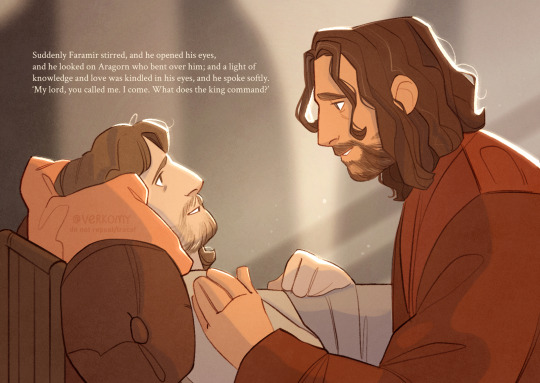
I think about this scene at least four times a week
But Aragorn smiled. ‘It will serve,’ he said. ‘The worst isnow over. Stay and be comforted!’ Then taking two leaves, he laid them on his hands and breathed on them, and then he crushed them, and straightway a living freshness filled the room, as if the air itself awoke and tingled, sparkling with joy. And then he cast the leaves into the bowls of steaming water that were brought to him, and at once all hearts were lightened. For the fragrance that came to each was like a memory of dewy mornings of unshadowed sun in some land of which the fair world in spring is itself but a fleeting memory. But Aragorn stood up as one refreshed, and his eyes smiled as he held a bowl before Faramir’s dreaming face.
‘Well now! Who would have believed it?’ said Ioreth to a woman that stood beside her. ‘The weed is better than I thought. It reminds me of the roses of Imloth Melui when I was a lass, and no king could ask for better.
Suddenly Faramir stirred, and he opened his eyes, and he looked on Aragorn who bent over him; and a light of knowledge and love was kindled in his eyes, and he spoke softly. ‘My lord, you called me. I come. What does the king command?’
‘Walk no more in the shadows, but awake!’ said Aragorn. ‘You are weary. Rest a while, and take food, and be ready when I return.’
‘I will, lord,’ said Faramir. ‘For who would lie idle when the king has returned?’
J. R. R. Tolkien, The Return of The King
#aragorn#faramir#lotr#the lord of the rings#lord of the rings#the return of the king#tolkien#fanart#book illustration#my art#verkomy#verkomy 2023#procreate
1K notes
·
View notes
Text
sometimes we just need someone to pay enough attention.
for the longest time i had been trying to read The Lord of The Rings. everyone had sung the praises for it, over and over. i'd seen clips of the movie and it seemed like it could be fun, but actually reading it was fucking horrible.
my parents had the omnibus - all the books squished into one big tome - and in the 4th grade i started sort of an annual tradition: i would start trying to read TLR and get frustrated after about a month and put it back down. at first i figured i was just too young for it, and that it would eventually make sense.
but every time i came back to it, i would find myself having the exact same experience: it was confusing, weird, and dry as a fucking bone. i couldn't figure it out. how had everyone else on earth read this book and enjoyed it? how had they made movies out of this thing? it was, like, barely coherent. i would see it on "classics" list and on every fantasy/sci-fi list and everyone said i should read it; but i figured that it was like my opinion of great expectations - just because it's a classic doesn't mean i'm going to like experiencing it.
at 20, i began the process of forcing myself through it. if i had to treat the experience like a self-inflicted textbook, i would - but i was going to read it.
my mom came across me taking notes at our kitchen table. i was on the last few pages of the first book in the omnibus, and i was dreading moving on to the next. she smiled down at me. only you would take notes on creative writing. then she sat down and her brow wrinkled. wait. why are you taking notes on this?
i said the thing i always said - it's boring, and i forget what's happening in it because it's so weird, and dense. and strange.
she nodded a little, and started to stand up. and then sat back down and said - wait, will you show me the book?
i was happy to hand it over, annoyed with the fact i'd barely made a dent in the monster of a thing. she pulled it to herself, pushing her glasses up so she could read the tiny writing. for a moment, she was silent, and then she let out a cackle. she wouldn't stop laughing. oh my god. i cannot wait to tell your father.
i was immediately defensive. okay, maybe i'm stupid but i've been trying to read this since the 4th grade and -
she shook her head. raquel, this is the Silmarillion. you've been reading the Silmarillion, not the lord of the rings.
anyway, it turns out that the hobbit and lord of the rings series are all super good and i understand why they're recommended reading. but good lord (of the rings), i wish somebody had just asked - wait. this kind of thing is right up your alley. you love fantasy. it sounds like something might be wrong. why do you think it's so boring?
#thanks for reminding me this happened#writeblr#warm up#i don't think this story translates well to the page#IRONIC!!!! :)#but yeah man i read the Silmarillion before i read the hobbit#the omnibus didn't explain what it was and i figured - you start at the beginning and then you read from the beginning#that's how books work#how was i supposed to know#EDIT IN THE TAGS: hi i think i worded this in a confusing way#the omnibus had ALL the stories in it - the silm#the hobbit#and all of LOTR#they just put the silm in the front so i thought logically it was the first book#that's how an omnibus usually works after all - the first book in the series is the first book in the tome#to be fair i GUESS the silm takes place “before” the hobbit????
6K notes
·
View notes